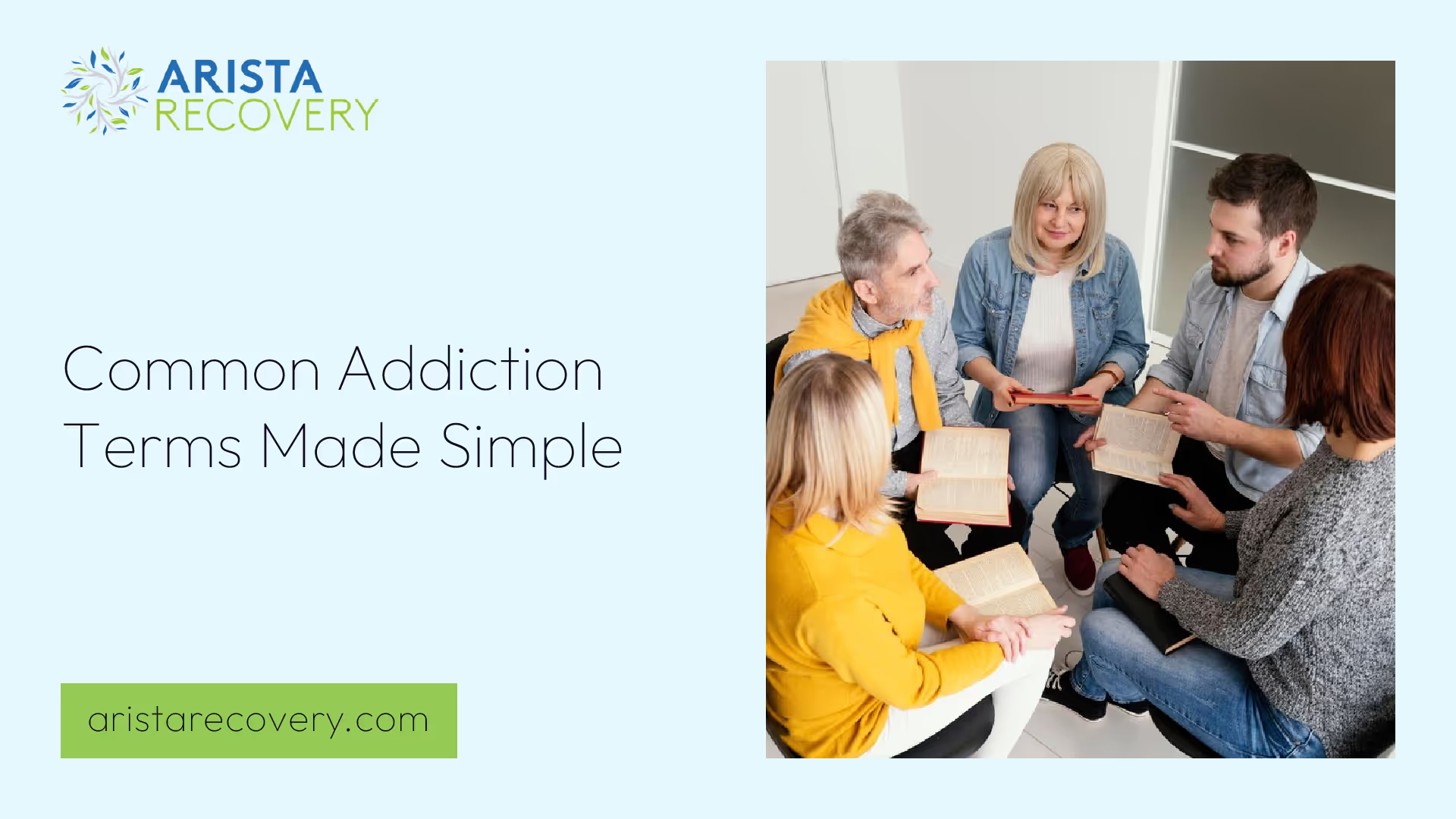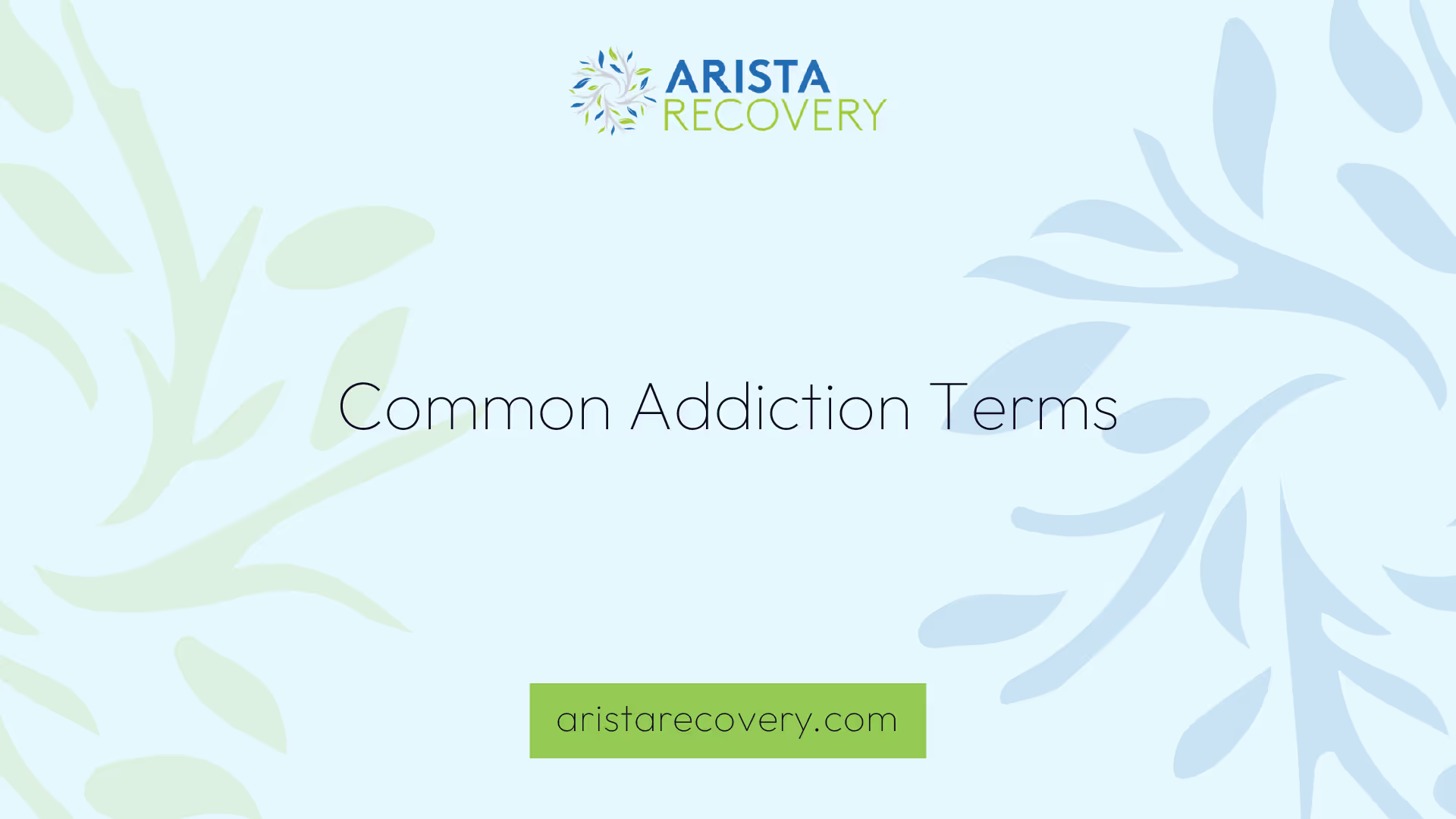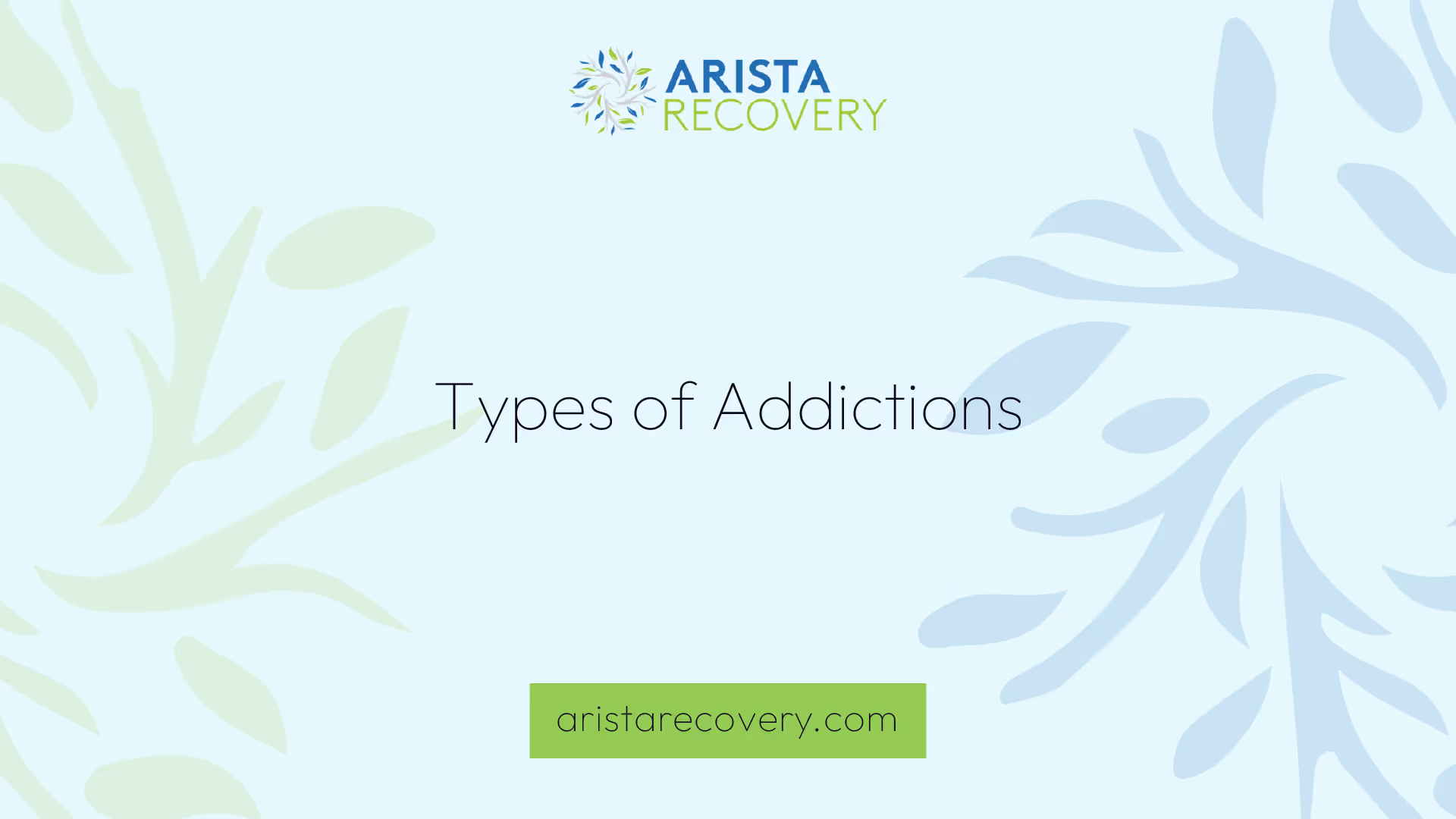Common Addiction Terms Made Simple


Understanding Addiction
To navigate the complex world of addiction, it is essential to have a clear understanding of the terminology associated with it. This section will provide a brief overview of the definition of addiction and address common myths and stigmas surrounding it.
Defining Addiction
Addiction, also known as a substance use disorder (SUD), is a chronic and relapsing brain disease that affects millions of people worldwide. It is characterized by compulsive drug-seeking and use, despite harmful consequences. Addiction can involve various substances, such as alcohol, opioids, stimulants, or illicit drugs. It can also manifest as behavioral addictions, such as gambling, gaming, or compulsive shopping.
It is important to recognize that addiction is not simply a matter of willpower or moral failing. It is a complex condition that affects the brain's reward system, leading to changes in behavior, cognition, and emotional regulation. Seeking professional help and support is crucial for managing addiction effectively.
Myths and Stigma around Addiction
Unfortunately, addiction is often surrounded by myths and stigmas that can hinder individuals from seeking help and support. These misconceptions contribute to the overall stigma associated with addiction and can perpetuate harmful stereotypes.
One common myth is that addiction is a choice or a result of weak character. However, addiction is a chronic disease that is influenced by a combination of genetic, environmental, and psychological factors. It is important to understand that addiction is not a moral failing but a treatable condition.
Another misconception is that individuals with addiction are dangerous or incapable of managing treatment. This stigma can lead to discrimination and prevent individuals from seeking the help they need. It is important to challenge these stereotypes and promote a compassionate and understanding approach towards individuals with addiction.
By dispelling myths and combating stigma, we can create a supportive environment that encourages individuals with addiction to seek treatment and embark on their journey to recovery. Education and awareness play a vital role in addressing the misconceptions surrounding addiction.
In the following sections, we will explore common addiction terms, types of addictions, the impact of addiction, addiction progression, and recovery and prevention strategies. Stay tuned to gain a comprehensive understanding of addiction and the resources available to support individuals on their path to recovery.

Common Addiction Terms
To navigate the complex world of addiction, it's important to have a good understanding of the common terms used in the field. This section will introduce three key terms: Substance Use Disorder (SUD), Substance Use Severity Specifiers, and Evidence-Based Treatment Language.
Substance Use Disorder (SUD)
Substance Use Disorder (SUD) is a term used to describe a range of problematic patterns of substance use that can lead to significant impairment or distress. It encompasses a wide range of substances, including alcohol and other drugs. The severity of SUD can vary from mild to moderate to severe. This classification helps clinicians in accurately assessing the severity of the disorder and creating effective treatment plans. For more information on SUD, refer to the Surgeon General's Report on Alcohol, Drugs, and Health.
Substance Use Severity Specifiers
When discussing SUD, using severity specifiers is recommended to indicate the severity of the disorder. This language supports accurate clinical assessment and effective treatment plans. It allows clinicians to determine the appropriate level of intervention and care for individuals struggling with addiction. The severity specifiers can be categorized as mild, moderate, or severe, depending on the impact of substance use on the individual's life. By using these specifiers, healthcare professionals can tailor treatment approaches to meet the specific needs of each individual. For a comprehensive understanding of the severity specifiers, refer to the National Institute on Drug Abuse (NIDA).
Evidence-Based Treatment Language
When discussing treatment plans for individuals with Substance Use Disorder, it is important to use evidence-based language to describe the interventions. This approach emphasizes the use of treatment strategies that have been scientifically proven to be effective in helping individuals recover from addiction. By using evidence-based language, healthcare professionals can communicate the credibility and efficacy of the treatment plans, as opposed to using terms like "intervention," which may not accurately convey the evidence-based nature of the treatment. For more guidance on using evidence-based language, refer to the resources provided by NIDA.
By familiarizing yourself with these common addiction terms, you can better understand the language used in the field of addiction and communicate effectively with healthcare professionals. This knowledge can empower you to seek appropriate treatment, support, and resources to address addiction-related challenges.

Types of Addictions
When it comes to understanding addiction, it's important to recognize that there are different types of addictions that individuals may struggle with. In this section, we will explore two main categories of addiction: substance addiction and behavioral addiction.
Substance Addiction
Substance addiction refers to the compulsive and harmful use of substances such as alcohol, drugs, or medications. It involves a physical and psychological dependence on these substances, often leading to the development of substance use disorder (SUD). Substance addiction is characterized by a range of symptoms, including cravings, tolerance (needing more of the substance to achieve the desired effect), withdrawal symptoms, and loss of control over substance use.
The impact of substance addiction can be far-reaching, affecting various aspects of an individual's life, including their physical health, mental well-being, relationships, and overall functioning. Substance addiction is a complex issue that requires comprehensive treatment, including detoxification, therapy, and support groups.
Behavioral Addiction
Behavioral addiction, also known as process addiction, refers to the compulsive and repetitive engagement in certain behaviors, resulting in negative consequences. Unlike substance addiction, behavioral addiction does not involve the use of substances but revolves around behaviors that individuals find rewarding or pleasurable.
Common examples of behavioral addictions include gambling addiction, internet addiction, gaming addiction, shopping addiction, and sex addiction. These behaviors can lead to a loss of control, harmful consequences, and an inability to stop engaging in the addictive behavior despite negative outcomes.
Studies suggest that behavioral addictions share common underlying mechanisms with substance-related addictions. Both types of addiction can activate reward pathways in the brain and lead to similar behavioral and psychological symptoms [3]. Behavioral addiction can have serious repercussions on an individual's life, affecting their relationships, work, finances, and overall well-being.
While behavioral addiction may not involve physical dependency like substance addiction, it can still cause significant distress and disruption in a person's life. Treatment for behavioral addiction often involves cognitive-behavioral therapy, support groups, and addressing any underlying psychological issues that may contribute to the addictive behavior.
Understanding the different types of addictions is crucial in recognizing and addressing addiction-related issues. Whether it's substance addiction or behavioral addiction, seeking professional help and support is vital for individuals looking to overcome their addiction and embark on the path to recovery. If you're seeking further information on addiction treatment options, please visit our article on behavioral addiction treatment.
Impact of Addiction
Addiction is not only a personal struggle but also has significant ramifications on a larger scale. Understanding the impact of addiction is crucial in addressing this widespread issue. In this section, we will explore the public health crisis caused by addiction, the relapse rates associated with it, and the social and economic consequences that follow.
Public Health Crisis
Addiction is a public health crisis that affects millions of individuals across the United States. In 2018, over 11% of Americans aged 12 and older reported using illicit substances within the month prior to being surveyed [4]. This staggering statistic highlights the urgent need for comprehensive approaches to prevention, treatment, and recovery.
The opioid crisis, in particular, has garnered significant attention. It has resulted in a widespread epidemic of opioid addiction, leading to countless overdose deaths and devastating consequences for individuals, families, and communities. The severity of the opioid crisis prompted the U.S. government to declare a public health emergency, acknowledging the urgent need for action [5].
Relapse Rates
Addiction is a chronic condition, and relapse is a common occurrence. It is estimated that 40-60% of individuals with addiction will experience a relapse at some point during their recovery journey. Relapse should be viewed as part of the recovery process rather than a failure, as it provides an opportunity to learn from setbacks and make necessary adjustments to treatment plans.
Preventing relapse requires ongoing support, education, and access to evidence-based treatment options. By addressing the underlying factors contributing to addiction and implementing effective relapse prevention strategies, individuals can increase their chances of maintaining long-term recovery.
Social and Economic Consequences
The impact of addiction extends beyond the individual struggling with substance use. It has far-reaching social and economic consequences that affect families, communities, and society as a whole. Some of the social consequences include strained relationships, damaged trust, and increased rates of domestic violence or child neglect.
Economically, addiction places a significant burden on healthcare systems, criminal justice systems, and workplaces. The cost of treating substance use disorders, providing rehabilitation services, and addressing associated medical complications can be substantial. Additionally, productivity losses due to absenteeism, decreased work performance, and unemployment contribute to the economic burden of addiction.
Addressing the impact of addiction requires a comprehensive approach that focuses on prevention, treatment, and support services. By increasing awareness, reducing stigma, and providing accessible and effective treatment options, we can work towards mitigating the public health crisis, reducing relapse rates, and lessening the social and economic consequences associated with addiction.
To learn more about addiction and recovery, consider exploring our article on movies about addiction and recovery.
Addiction Progression
Understanding the progression of addiction is essential in recognizing and addressing the problem effectively. This section will explore the concepts of tolerance vs. dependence, physical vs. psychological dependence, and signs that indicate a transition from tolerance or dependence to addiction.
Tolerance vs. Dependence
Tolerance refers to the reduced effectiveness of a substance over time, leading to the need for higher doses to achieve the same results [5]. It is important to note that tolerance does not necessarily indicate addiction, but it can be a precursor to it. Individuals who develop tolerance may feel the need to increase their substance intake to experience the desired effects.
On the other hand, dependence occurs when the body starts to rely on a drug, leading to withdrawal symptoms if the drug is stopped suddenly. There are two types of dependence: physical and psychological.
Physical vs. Psychological Dependence
Physical dependence occurs when the body adapts to the presence of a substance and requires it to function normally. Abruptly stopping the substance can lead to withdrawal symptoms. Examples of substances that can cause physical dependence include caffeine, nicotine, and pain relievers such as narcotics [5].
Psychological dependence, on the other hand, is a strong emotional or mental reliance on a substance. It involves intense cravings and a perceived need for the substance to cope with stress, emotions, or other psychological factors. Psychological dependence often accompanies physical dependence, making addiction more likely to occur [6].
Signs of Addiction Transition
The transition from tolerance or dependence to addiction is characterized by various signs. These signs indicate that substance use has become problematic and is negatively impacting an individual's life. Some common signs include:
Recognizing these signs is crucial in identifying when substance use has crossed the line into addiction. If you or someone you know is exhibiting these signs, it is important to seek professional help and support.
Understanding the progression of addiction can help individuals and their loved ones take proactive steps towards recovery and prevention. By recognizing the difference between tolerance and dependence and being aware of the signs of addiction transition, it becomes possible to address addiction issues effectively and seek appropriate treatment and support.
Recovery and Prevention
When it comes to addiction, recovery and prevention are crucial components in addressing the challenges individuals face. By understanding the available resources and strategies, individuals can take steps towards overcoming addiction and maintaining long-term wellness.
Overcoming Addiction
Overcoming addiction is a complex and personal journey. It involves a combination of various treatment approaches, including medical, psychological, and social interventions. While there is no one-size-fits-all solution, seeking professional help is essential for a successful recovery.
Treatment for substance addiction often begins with detoxification to rid the body of the addictive substance. This is followed by a combination of therapies, such as behavioral therapy, counseling, support groups, and medication-assisted treatment. The goal is to address the physical, psychological, and social aspects of addiction, helping individuals develop coping mechanisms and skills to maintain sobriety.
For individuals struggling with behavioral addiction, such as gambling or gaming addiction, treatment may involve similar therapeutic approaches. Cognitive-behavioral therapy, support groups, and lifestyle changes are often recommended to help individuals regain control over their behaviors.
Behavioral Addiction Treatment
Behavioral addiction treatment focuses on addressing the underlying causes and triggers of addictive behaviors. Therapists work with individuals to identify and modify unhealthy thought patterns and behaviors. This may involve developing new coping strategies, improving emotional regulation, and enhancing problem-solving skills.
Support groups, such as Gamblers Anonymous or Sex Addicts Anonymous, can also play a vital role in behavioral addiction treatment. These groups provide a safe and supportive environment for individuals to share their experiences, learn from others, and receive encouragement during their recovery journey.
Addressing Underlying Psychological Issues
It is important to recognize that addiction is often intertwined with underlying psychological issues. Conditions such as stress, anxiety, depression, trauma, and other mental health disorders can contribute to the development of addiction. Addressing these underlying psychological issues is crucial in preventing addictions and supporting long-term recovery.
Treating these underlying issues typically involves a combination of therapy and medication, as determined by a qualified mental health professional. Therapy sessions aim to explore and address the root causes of psychological distress, while medication may be prescribed to manage symptoms and support overall mental well-being.
By recognizing and treating underlying issues, individuals can reduce the risk of developing addiction and improve their chances of successful recovery. It is important to seek professional help from qualified healthcare providers or addiction specialists to develop a personalized treatment plan that addresses individual needs.
Remember, recovery from addiction is a journey that requires ongoing commitment, support, and self-care. It is important to surround yourself with a strong support system, engage in healthy coping mechanisms, and prioritize self-care activities. With the right tools, resources, and support, individuals can overcome addiction and lead fulfilling, addiction-free lives.
References
[2]:
[3]:
[4]:
[5]:
[6]:
You’re not alone in this.
When mental health challenges and addiction intersect, it can feel isolating. At Arista, we offer compassionate, evidence-based, and trauma-informed care to help you heal, grow, and move forward.
You’re not alone in this.
When mental health challenges and addiction intersect, it can feel isolating. At Arista, we offer compassionate, evidence-based, and trauma-informed care to help you heal, grow, and move forward.
Support that moves with you.
You’ve taken a brave first step. At Arista Recovery, we’re here to help you continue with best-in-class care designed for long-term healing and support.
.webp)






